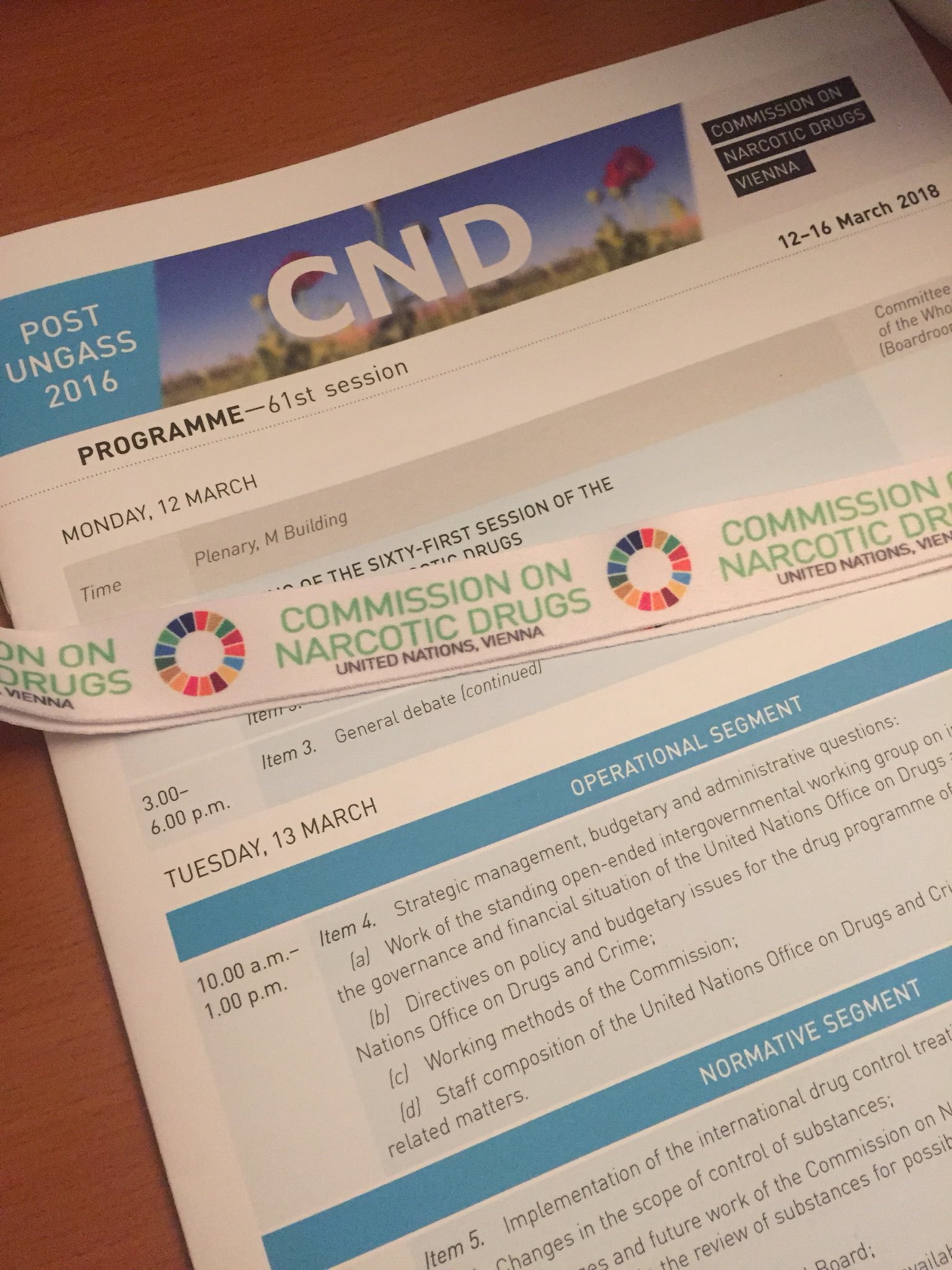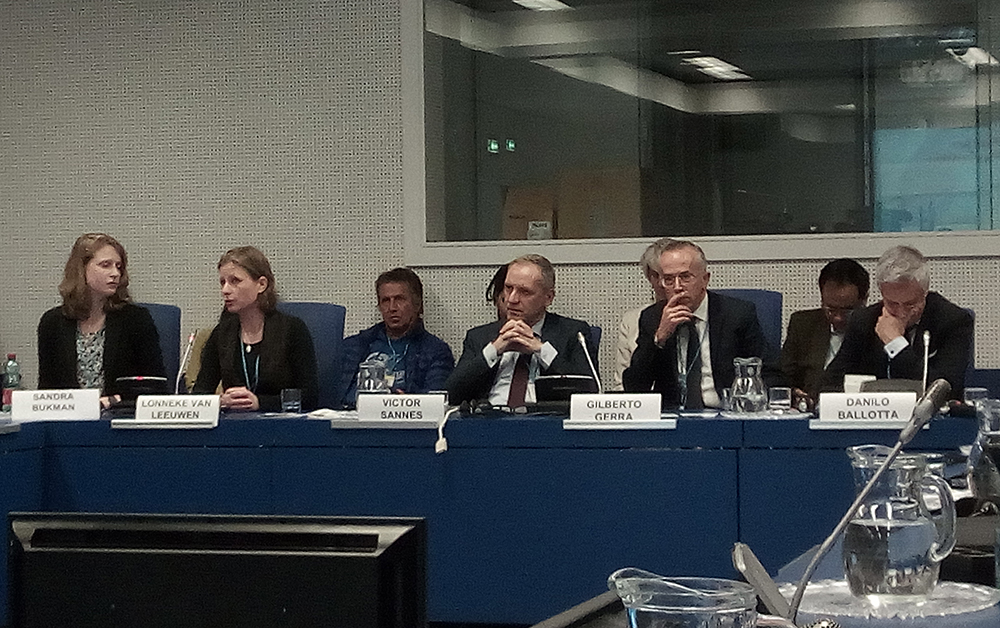The event “got up steam” these two days. Here are some reflections and information.
Wednesday 14 March
Impact of life skills education programmes on prevention in schools: experience in southeast Europe and Latin America
Gilberto Gerra, Chief of Drug Prevention and Health Branch of UNODC welcomed participants, including diplomatic representatives from Bosnia Herzegovina, Macedonia, Montenegro and Serbia. He underlined importance of civil society role and the success of the programme and thanked Lions Clubs International.
Matthew Kiefer, Manager of the Lions Quest Skills for Adolescence Programme presented the programme which is based on social and emotional learning. It incorporates the community and family through activities such as service learning. Since 2014 piloting was undertaken in Serbia, Macedonia and Montenegro. In 2017 Bosnia Herzegovina was added and plans for this year are to start in Guatemala and Albania.
Miloš Stojanović, UNODC Regional DDR Officer for South East Europe emphasized the importance of collaboration between UNODC and Lions Club which gives excellent results. So far, more than 4.500 adolescents were involved in the programme. UNODC plans scaling up of programme results in SEE in 2018 and 2019. Melva Ramirez, UNODC Regional DDR Officer for Central America and Caribbean, presented the initial results of the programme in Guatemala. Wadih Maalouf, UNODC Global Programme Coordinator, presented impact among adolescent on prevention and substance use (specifically alcohol, tobacco and marijuana).
Representatives of Montenegro and Bosnia Herzegovina presented results of the work in their countries.
The urgent need for harm reduction funding: Scaling-up evidence-based interventions for people who use drugs
This event was organised by the Strategic Advisory Group to the UN on HIV and Drug Use, with the aim to highlight the latest evidence on the state of the harm reduction response around the world and explore challenges related to increasing financial and political support for harm reduction and the strategies to overcome them.
Chair of the event was Anne Skjelmerud, NORAD, Norway. Speakers were Dr. Gilberto Gerra, Chief, Drug Prevention and Health Branch, UNODC, Dr. Monica Beg, Chief, HIV/AIDS Section, UNODC, Aljona Kurbatova, National Institute for Health Development, Estonia, Valentin Simionov, International Network of People who Use Drugs and Fionnuala Murphy, Harm Reduction International.
Interesting points from the presentations include:
- Anne Skjelmerud opened the event and presented Norwegian experiences with harm reduction. Today in Norway, HIV is not the key problem but HR is still an issue and programmes exist.
- Anne Frodham from IDPC talked about the work of the Strategic Advisory Group to the UN on HIV and Drug Use which is comprised of various stakeholders coming from both governmental and civil society sectors.
- Dr. Monica Beg presented facts about HIV and drug connection. Globally, PWID account for 8% of all new HIV infections. In EECA, they account for 65% of HIV cases. Average 33 needle-syringes are distributed per person a month, which is far lower than needed (200). UNODC supports some countries, none in SEE.
- Aljona Kurbatova talked about harm reduction in Estonia.
- Valentin Simionov presented history, aims and mission of INPUD. Death Penalty is still imposed in 32 countries. But, around 8 out of 10 drug related offences are for drug possession only. Only 8% of people in need get harm reduction services. 70.000 – 100.000 people die of opioid overdose annually. Stigma and discrimination are direct result of discrimination of drugs and drug users.
- Fionnuala Murphy: overdoses kill more people than murders and traffic accidents together. Situation is critical due to donors withdrawal and lack of national funding.
Notes from this side event are available at the CND blog.
The future of drug prevention: How to personalize your strategy to be more effective
The event was organized by the Government of the Netherlands, UNODC, Treatment and Rehabilitation Section, and the European Monitoring Centre for Drugs and Drug Addiction.
Speakers were Victor Sannes, Dr Lonneke van Leeuwen, Trimbos Institute, Dr Sandra Bukman, University of Applied Siencies, Utrecht, Gilberto Gerra, UNODC and Danilo Ballotta, EMCDDA.
Project run by the Institute and the University to understand the types of young people to be able to prepare personalised prevention. Which substance use-related subgroups of young adults were identified in earlier studies? Five groups were identified: no substance; alcohol; plus tobacco and marijuana; plus ecstasy, cocaine, amphetamine and hallucinogens; plus prescriptive medicines. The same research was done interviewing young people. This led to identifying 14 subgroups varying on preferred substance, reasons for use, context of use and intention to reduce or quit.
Gilberto Gerra: Personalisation of prevention is important because we need to see people as persons, not as a statistic number.
Danilo Ballotta: Especially for young people, effective prevention interventions cannot ignore personality traits and environmental context. EU adopted the approach that prevention is not substance focused. EU doesn’t have a programme for nightlife setting.
Other side events
Notes about some interesting side events are available:
- Voices from the ground: The impact of drug policies on women in situations of vulnerability
- Treatment and Care of people with drug use disorder in contact with the criminal justice system
- Youth and law enforcement
- The urgent need for harm reduction funding: Scaling-up evidence-based interventions for people who use drugs
- The role of civil society in the implementation of the UNGASS 2016 outcome
- Informal NGO Dialogue with the UNODC Executive Director
Thursday 15 March
The criminal justice role in the implementation of drug policies in a human rights perspective
The event, organized by the Brazilian Harm Reduction and Human Rights Network presented a model of alternative measures offered to people who use drugs.
We heard about the project “REDES” – Social inclusion in crime and drug use prevention – which is a response to harsh situation in Brazil. Law enforcement structures launched “Custody Hearings Project” which ensures a quick presentation to the judge, a maximum 24 hours after the arrest. The Oswaldo Cruz Foundation was part of the partnerships that developed the project. It provides a support network: health, social assistance, human rights, personal identification documents, housing, work and others. Those who are charged for drug use pass through the process and are granted liberty. They are addressed to the social services providers. One of the most important results is improved sensibility of the judges.
Special event: Strengthening the global prevention response: International standards for drug use prevention – second edition, listen first campaign and stronger families programme
This special event was organized by the Governments of France, Norway and the United States of America, the World Health Organization, the United Nations Office on Drugs and Crime Drug Prevention and Health Branch, and the Vienna NGO Committee on Drugs.
The high-level representatives of organising institutions from France, USA, Norway and Mexico spoke about the role of evidence-based prevention in strengthening the global response and the role of civil society in supporting evidence based prevention.
Giovanna Campello, Officer in Charge, Prevention Treatment and Rehabilitation Section, presented the UNODC and WHO Second Updated Edition of the International Standards on drug prevention (LINK NA http://vngoc.org/wp-content/uploads/2017/03/Concept-note-2017-International-Standards-Update.pdf). Dr Virginia Molgaard and Dr Alaa Al Khani presented “Strong Families” – a new UNODC programme for families in low- and middle income families, including refugee families (LINK NA https://www.unodc.org/ropan/en/DrugDemandReduction/strong-families.html). The first 2018 video the “Listen First” campaign was released.
https://www.youtube.com/watch?v=KVvHNFeUlL8
HIV prevention, treatment care and support for people who use stimulants
This event was organized by the Government of Romania and the United Nations Office on Drugs and Crime HIV/AIDS Section.
Romania showcased their experience with stimulants, which they simply call new psychoactive substances. We think that it is not quite good connection. Other speakers, Monica Beg, Chief of the HIV/AIDS Section, UNODC, Judy Chang, Executive Director, INPUD, Brun Gonzales, Mexico and Ukrainian activist spoke more about actual new substances.
The right to science and freedom of research with scheduled substances
This interesting side event dealt with conventions and the current barriers regarding research with scheduled substances, as well as present cutting edge scientific research on the therapeutic use of scheduled substances, such as cannabis, MDMA, psilocybin and ibogaine, as treatment for posttraumatic stress disorder (PTSD), depression, and problematic substance use. The full video of the side event is bellow.
Other side events
Notes about some interesting side events are available:
VNGOC General Assembly
The Vienna Non-Governmental Organization (NGO) Committee on Drugs (VNGOC) held its General Assembly on 15 March. A new Board was elected, with our good friend Jamie Bridge serving as the Chairperson. DPNSEE paid the membership fee and hope to complete the membership process soon.
Closing Notes
The 61st session, chaired by Ambassador Alicia Buenrostro Massieu of Mexico, agreed 11 resolutions on various topics among them enhancing international cooperation to combat the synthetic opioid crisis, removing stigma as a barrier to the availability and delivery of health, care and social services for people who use drugs, and on preparations for the planned ministerial segment at the 2019 session. The first ever resolution of stigma and discrimination of people who use drugs is a great step forward!
“Ministerial segment” refers to high level meeting of ministers – a very important meeting that will be held as part of the CND next year. Some very important fights and decisions are expected. This CND indicated that there will be a lot of disagreements between those who still believe in rigid repressive approach and those who think that modern and innovative solutions are needed. Civil society organisations were very active in promoting the later, working hard around the meeting to promote it.
The Commission also agreed to schedule six analogues of fentanyl, including carfentanil, under the international drug control conventions. Abuse of fentanyl, which is 100 times more potent than morphine, has led to thousands of overdose deaths around the world.
More than 1.500 participants from Member States, inter-governmental organizations, academia, civil society and the private sector took part in the session.
The CND was an excellent opportunity to meet with colleagues and partners. We used it to share with Alexis Goosdeel, Director of the EMCDDA, Daniel Wolfe, director of International Harm Reduction Development and Matthew Wilson, Global Drug Policy Program, Open society Foundations, Marie Nougier, Head of Research and Communications and Juan Fernandez Ochoa, Campaigns and Communications Officer, IDPC, Jose Queiros, Executive Director APDES, Portugal, Thomas Bridgen, Grants Coordinator, Elton John AIDS Foundation, Richard Elliott, Executive Director, Canadian HIV/AIDS Legal Framework, John-Peter Kools and Daan van der Gouwe, Trimbos Instituut, Dr Claire Mawditt, Secretary of Women and Harm Reduction International Network (WHRIN) and Matej Košir from Institute for Research and Development “Utrip”, Slovenia.
Interesting and important exchange was held with heads of national agencies responsible for drugs: Milan Pekić from Serbia, Željko Petković from Croatia, Ognjen Zekić from Bosnia Herzegovina and Catalin Negoi-Nita from Romania.
With our colleagues from Diogenis Thanasis Apostolou, Sofia Galinaki and Olga Pateraki, we had very good information share and some concrete agreements for future events.









